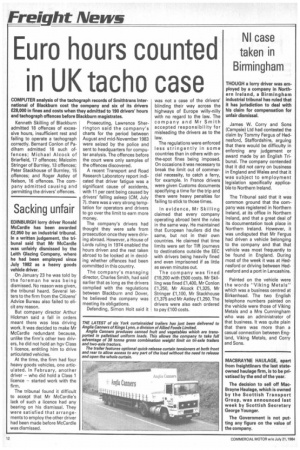Euro hours counted in UK tactic) case
Page 14

If you've noticed an error in this article please click here to report it so we can fix it.
COMPUTER analysis of the tachograph records of Smithtrans International of Blackburn cost the company and six of its drivers E28,000 in fines and costs when they admitted to 190 drivers' hours and tachograph offences before Blackburn magistrates.
Kenneth Skilling of Blackburn admitted 18 offences of excessive hours, insufficient rest and failing to operate a tachograph correctly. Bernard Conlon of Padiham admitted 16 such offences; Michael Alcock of Briarfield, 17 offences; Malcolm Stringer of Burnley, 13 offences; Peter Stackhouse of Burnley, 15 offences; and Roger Astley of Nelson, 16 offences. The company admitted causing and permitting the drivers' offences. Prosecuting, Lawrence Sherrington said the company's charts for the period between August and mid-November 1983 were seized by the police and sent to headquarters for computer analysis. The offences before the court were only samples of the offences discovered.
A recent Transport and Road Research Laboratory report indicated that driver fatigue was a significant cause of accidents, with 11 per cent being caused by drivers' falling asleep (CM, July 7). there was a very strong temptation for operators and drivers to go over the limit to earn more money.
The company's drivers had thought they were safe from prosecution once they were driving abroad. However, a House of Lords ruling in 1974 enabled the hours driven and the rest taken abroad to be looked at in deciding whether offences had been committed in this country.
The company's managing director, Charles Smith, had said earlier that as long as the drivers complied with the regulations between Blackburn and Dover, he believed the company was meeting its obligations.
Defending, Simon Holt said it was not a case of the drivers' blinding their way across the highways of Europe willy-nilly with no regard to the law. The company and Mr Smith accepted responsibility for misleading the drivers as to the law.
The regulations were enforced less stringently in some countries than in others with onthe-spot fines being imposed. On occasions it was necessary to break the limit out of commercial necessity, to catch a ferry, for example. In France drivers were given Customs documents specifying a time for the trip and there were heavy penalties for failing to stick to those times.
In evidence, Mr Skilling claimed that every company operating abroad bent the rules in the same way. He maintained that European hauliers did the same, but not in their own countries. He claimed that time limits were set for TIR journeys to destinations outside the EEC with drivers being heavily fined and even imprisoned if as little as seven minutes out.
The company was fined £19,200 with £500 costs. Mr Skilling was fined £1,400, Mr Conlon £1,250, Mr Alcock 1E1,325, Mr Stringer £1,100, Mr Stackhouse £1,375 and Mr Astley £1,250. The drivers were also each ordered to pay £100 costs.




















































































